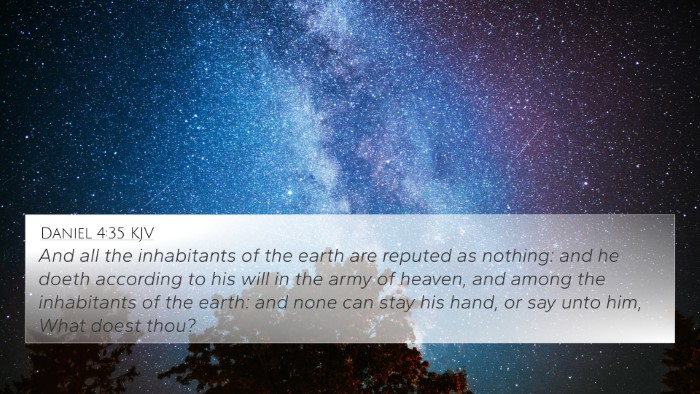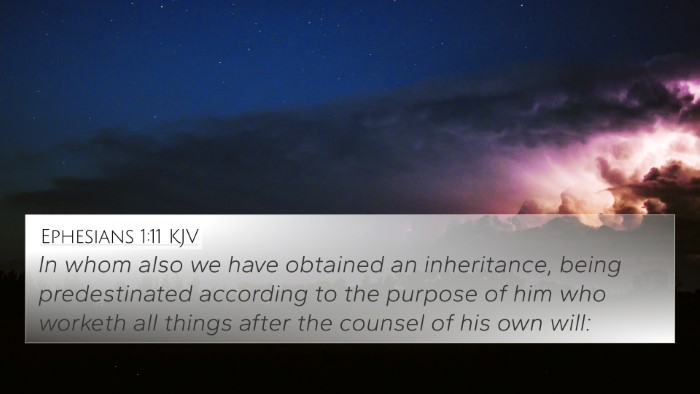Understanding Job 9:12
Job 9:12 states, "If the Lord takes away something from me, who can stop Him?" This verse encapsulates the profound realization of Job concerning God's sovereignty and the futility of resisting divine will. Through various commentaries, we can glean a richer understanding of this verse.
Insights from Public Domain Commentaries
Matthew Henry's Commentary
Matthew Henry emphasizes the idea that God's will is irresistible. He notes that Job acknowledges the absolute power and authority of God. When Job laments, “who can say to Him, ‘What are you doing?’” (Job 9:12b), he highlights the futility of questioning God's decisions. Henry points out that Job is in a position where he cannot dispute God's choices, indicating a posture of humility and reverence before the Almighty.
Albert Barnes' Commentary
Albert Barnes provides a detailed exploration of this verse by focusing on the acceptance of God’s will. He notes that Job recognizes the limitations of human power compared to divine authority. Job's statement about not being able to stop God implies an understanding of human vulnerability and God's omnipotence. Barnes elucidates that this acknowledgment leads to a sense of profound despair but also a kind of faith in the ultimate justice and wisdom of God.
Adam Clarke's Commentary
Adam Clarke’s interpretation reflects on the concept of divine sovereignty, highlighting that Job is essentially affirming that once God has decided to act, no one can oppose Him. Clarke points out that this recognition releases Job from the burden of trying to comprehend God's actions and allows him to express the emotional turmoil he feels. Clarke stresses the importance of accepting God's sovereignty even amid suffering.
Thematic Connections
This verse invites us to explore significant themes within the Bible related to divine sovereignty and human limitations. The reflections from the commentaries allow us to connect Job's desperate plea with broader biblical truths.
Cross-References to Job 9:12
- Isaiah 43:13 - “Indeed, before the day was, I am He; and there is no one who can deliver out of My hand; I work, and who will reverse it?” This verse echoes the sovereignty of God over all events.
- Romans 9:19-21 - Paul discusses God's right over His creations, paralleling Job's recognition of human limitation in the face of divine will.
- Psalms 115:3 - “But our God is in heaven; He does whatever He pleases.” This emphasizes God's sovereignty and freedom to act as He chooses.
- Proverbs 21:1 - “The king's heart is in the hand of the Lord, like the rivers of water; He turns it wherever He wishes.” This illustrates God’s control over worldly affairs.
- Job 36:22-23 - “Behold, God is exalted by His power; who teaches like Him? Who has assigned Him His way, or who has said, ‘You have done wrong?’” This directly correlates with Job's understanding of God's unmatched authority.
- Psalm 46:10 - “Be still, and know that I am God; I will be exalted among the nations, I will be exalted in the earth!” This invites believers to recognize God’s power and presence.
- Jeremiah 10:23 - “O Lord, I know the way of man is not in himself; it is not in man who walks to direct his own steps.” This supports the theme of divine guidance over human action.
Application and Personal Reflection
As we meditate on Job 9:12, let us reflect on the nature of our relationship with God. Understanding His sovereignty offers comfort during suffering, reminding us that we can trust in a higher purpose. Applying the insights from the commentaries, we can appreciate that feeling overwhelmed or confused is natural, but surrendering to God’s will ultimately leads to peace.
Conclusion
The verse Job 9:12 serves as a potent reminder of our place in relation to God’s sovereign will. By studying cross-references and connecting themes throughout Scripture, we enrich our understanding of God's nature and His relationship with humanity. This exploration enhances our study of biblical texts, providing a framework for prayer, meditation, and further inquiry into the depths of scriptural truths.
Further Study Tools
For those seeking to dive deeper into cross-referencing and understanding connections between Bible verses, several tools are highly useful:
- Bible Concordance: A useful resource to find keywords and locate verses.
- Bible Cross-Reference Guide: Helps trace thematic links across different scriptures.
- Cross-Reference Bible Study: Engaging in study methods that highlight connections and parallels.
- Comprehensive Bible Cross-Reference Materials: Can provide exhaustive references for thorough examination.














